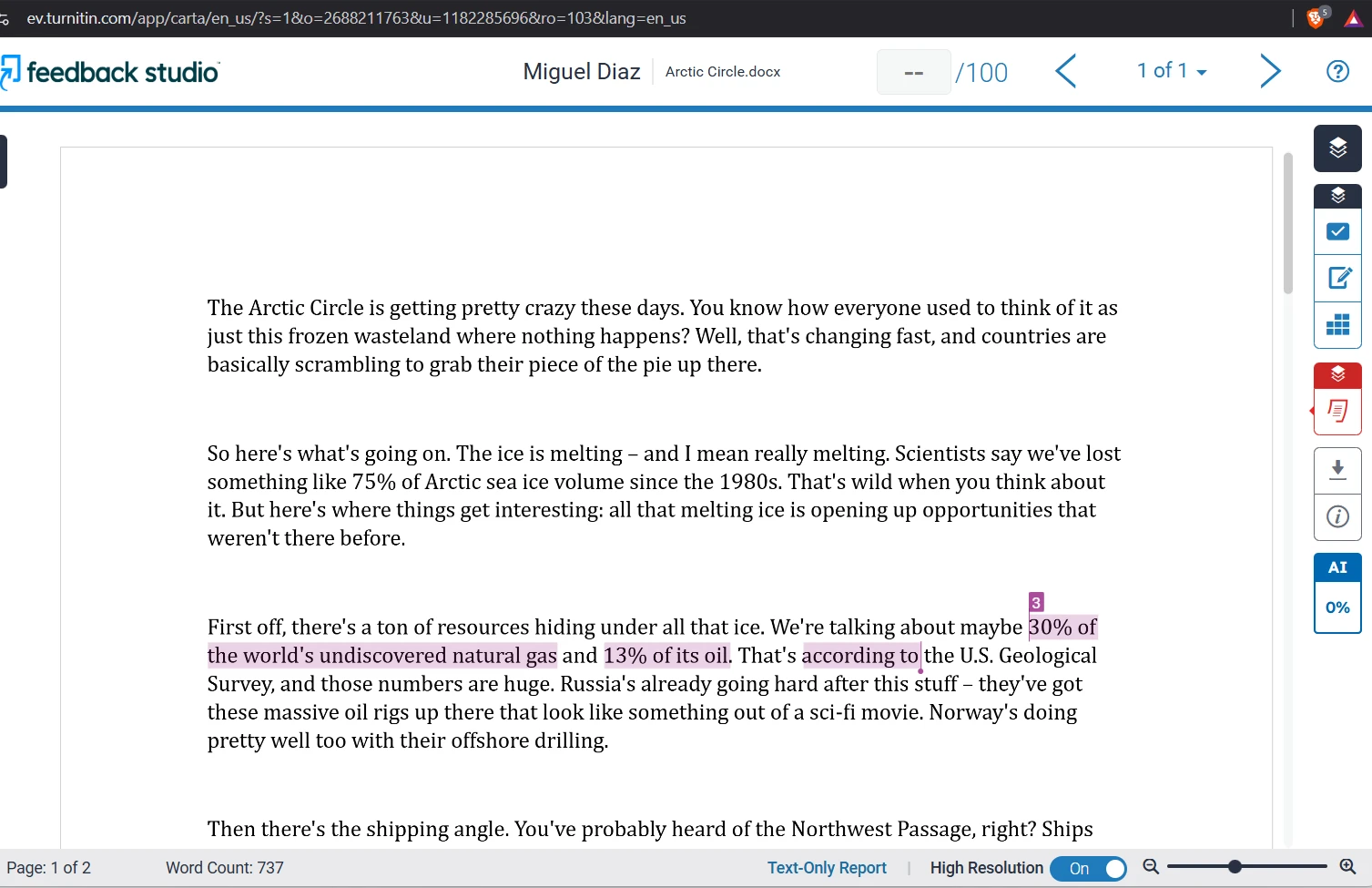As we all know it Turnitin is one of those AI detectors that has made the lives of students a living hell. But, does it do the same for Claude Opus 4? The short answer is that it’s complicated. Keep reading to know more about it.
Why Claude Opus 4 might or might not be detected by Turnitin?

Claude Opus 4 is a next-generation coding model from Anthropic, billed as the “world’s best coding model,” with a SWE-bench score of 72.5% and a Terminal-bench score of 43.2%. It is not made to bypass AI detectors like Turnitin. Hence, if it is not made to accomplish this task it won't be able to do it consistently.
However, the tricky part is that sometimes you can slip through Turnitin’s AI detection (free) simply because Opus 4 is new. The folks at Turnitin might not have fully updated their training data with Opus 4’s outputs. So, there is a short window where it might pass undetected. That’s pretty much the main reason behind it evading detection in some cases.
My personal experience with Turnitin and Opus 4
I tested 10 samples on Turnitin which were written by Claude Opus 4. Out of these, 3 of it went undetected. That’s a 30% undetected rate. You can see the results in my google sheet. One simple reason for it could be that Turnitin’s system is not fully trained on Claude Opus 4’s style.
Also, don’t be surprised if this changes overnight. AI detectors keep updating themselves regularly. That means the text that got through detection unscathed a week ago might get flagged a month later.
Here are the humanizer prompts that worked:
Prompt #1:
You are a Ph.D student working on an essay on The Geopolitical Significance of the Arctic Circle of more than 500 words. Generate text that avoids using formal or overly academic phrases such as 'it is worth noting,' 'furthermore,' 'consequently,' 'in terms of,' ‘delve,’ ‘in today’s world,’ 'one may argue,' 'it is imperative,' 'this suggests that,' 'thus,' 'it is evident that,' 'notwithstanding,' 'about,' 'therein lies,' 'utilize,' 'be advised,' 'hence,' 'indicate,' 'facilitate,'' subsequently,'' moreover,' and 'it can be seen that.' Aim for a natural, conversational style that sounds like two friends talking at the coffee shop. Use direct, simple language, and choose phrases commonly used in everyday speech. If a formal phrase is essential for clarity or accuracy, you may include it, but otherwise, please prioritize making the text engaging, clear, and relatable.
Prompt #2:
Write on The Impact of Parental Involvement on Student Academic Success from the perspective of an expert role related to the topic, sharing practical advice and lessons learned over the years.
Prompt #3:
You are a Ph.D student working on an essay on The Impact of GPS on Global Supply Chain Logistics of more than 500 words. Generate text that avoids using formal or overly academic phrases such as 'it is worth noting,' 'furthermore,' 'consequently,' 'in terms of,' ‘delve,’ ‘in today’s world,’ 'one may argue,' 'it is imperative,' 'this suggests that,' 'thus,' 'it is evident that,' 'notwithstanding,' 'about,' 'therein lies,' 'utilize,' 'be advised,' 'hence,' 'indicate,' 'facilitate,'' subsequently,'' moreover,' and 'it can be seen that.' Aim for a natural, conversational style that sounds like two friends talking at the coffee shop. Use direct, simple language, and choose phrases commonly used in everyday speech. If a formal phrase is essential for clarity or accuracy, you may include it, but otherwise, please prioritize making the text engaging, clear, and relatable.
How does Turnitin catch AI writing?
Turnitin relies on their own proprietary deep-learning models (AIW-2 and AIR-1) which assign each text segment an “AI-likelihood” score. They check the text for uniformity, coherence, and repetitiveness. AI-generated text often looks too perfect, uses consistent grammar, and operates at very low burstiness or perplexity levels.
Opus 4 can produce extremely coherent, logically consistent content, which ironically makes it more “AI-like.” So, if Turnitin specifically trains on Opus 4 outputs, it can easily pick up the patterns once they spot it enough times.
Claude Opus 4: Quick Facts & Figures
Below is a short table outlining some details about Claude Opus 4:
| Component | Description / Value |
|---|---|
| SWE-bench Score | 72.5% |
| Terminal-bench Score | 43.2% |
| Pricing (Input Tokens) | $15 per million |
| Pricing (Output Tokens) | $75 per million |
| Memory Improvements | Better usage of local file access, improved continuity |
Claude Opus 4 is also capable of extended thinking with tool use, meaning it can consult external sources (like web search) to refine its output. That’s great for complex tasks but does nothing special to hide from AI detectors.
Which rewriter is made to do the bypassing job?
If your main aim is to dodge Turnitin (not recommended for honest academic work), you should look for specialized rewriters or AI text humanizers specifically tuned to slip past detectors. Tools like Deceptioner are specifically made to do that. Claude Opus 4 has a different focus - sophisticated coding tasks, advanced reasoning, and large-scale text generation.
Frequently Asked Questions
Q1. Can Turnitin detect Claude Opus 4?
Yes, it can detect Opus 4, but not always. In my tests, 3 out of 10 outputs were undetected. As Turnitin’s AI models learn more about Opus 4’s writing pattern, the detection rate might spike.
Q2. Is using Claude Opus 4 for academic writing plagiarism?
No, the act of using Claude Opus 4 is not plagiarism per se, but if you submit AI-generated text as your own, it may violate academic honesty policies. It can also flag Turnitin’s AI detection if recognized.
Q3. Is there a possibility Turnitin will get better at detecting Opus 4?
Definitely yes, Turnitin is constantly refining their system. Once they gather enough training data, they’ll likely detect Opus 4’s style more accurately.
Q4. Why put so much emphasis on grammar and style?
Because AI text often looks too polished and uniform. Turnitin’s system picks up on that. Even a perfect text can sometimes be flagged if it sees some uniform patterns typical of AI writing.
Q5. Does extended thinking capability help it evade Turnitin?
Not at all. Extended thinking is for better reasoning and coding solutions. It doesn’t hamper detection. Actually, more consistent reasoning might even lead Turnitin to label it as AI.
The Bottom Line
Claude Opus 4 is an amazing text-generation and coding model but it is not explicitly made to bypass AI detectors. Therefore, Turnitin’s AI detection can still flag it. Right now, it might pass some Turnitin checks if you are lucky, but it won’t be a foolproof method. Once Turnitin starts training on more Opus 4 outputs or refines its algorithms, it will detect the text more reliably.
If you genuinely need to bypass Turnitin (for legitimate usage or testing purposes), you might want to try specialized tools that are purpose-built for that. However, the single opinion and advice I would give is that you shouldn’t rely on an AI content generator alone for critical work—try using your own voice or do a thorough manual edit so Turnitin or any other AI detector sees something that is genuinely unique to you.



